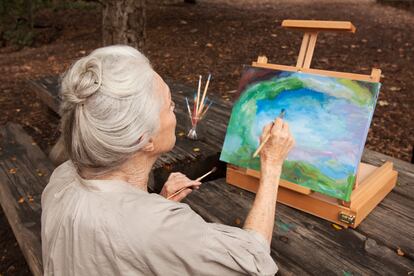A study shows that cultivating a hobby improves the health of the elderly
People who fill their time with activities after age 65 is happier and have a better quality of life, according to a recently published meta-analysis

When Cristina Gil moved from the center of Madrid to the municipality of Mostoles, the first thing this 73-year-old Spanish woman did was go to the local senior center. She didn’t know anyone in the neighborhood and had free time, so she decided to fill her days with activities. “Now I’m starting theater; I’ve been doing it for a little more than a year. I also do mindfulness and stretching. And this year I signed up for line dancing,” she says. Every week she goes to the movies and occasionally to the theater. A meta-analysis published this Monday in the journal Nature Medicine shows that her attitude is positive: cultivating hobbies improves happiness and quality of life after age 65. “It’s a fact,” Gil emphasizes, alluding more to personal experience than science. “When I arrived here I felt alone and bad; now I have a group of friends, all in the same situation as me, and I am very well.”
“Hobbies can have the potential to protect against age-related declines in mental health and improve well-being,” explains Karen Mak, a statistical researcher at the University College of London and co-author of the study. “This has profound consequences for morbidity and mortality,” she adds. These conclusions confirm an idea that scientific literature has been repeating for years; what makes this study special is the magnitude of its database. Also, the transversality of its conclusions and the differences found between countries: after analyzing data from 93,263 people from 16 countries, the meta-analysis found that Denmark (96%), Sweden (95.8%) and Switzerland (94.4%) had the highest levels of retirees with hobbies, followed by Germany (91%), Austria and Japan (90%). At the other end of the spectrum, Italy (54%), Spain (51%) and China (37.6%) presented the lowest levels.
The study notes that people who live in countries with longer life expectancy or higher levels of happiness may be more likely to have a hobby, using Denmark, Sweden, and Switzerland as examples. The study also encourages countries to take measures, stating that ensuring access to hobbies should be a priority to promote healthy aging. There are many determining factors that influence whether an older person decides to cultivate a hobby: at a community level, Mak mentions “neighborhood safety, social connectivity and social relationships.” At an individual level, people with certain demographic characteristics may be less likely to devote their time to this kind of activities, such as men or people with lower educational and economic levels.
Cristina is a middle-class woman who says that Mostoles is a “happy and safe” neighborhood. In addition, she explains, there are discounts at movies and senior centers that have made it easier for her to cultivate her hobbies. She meets each and every one of the conditions mentioned by Mak.
How about a beer?
The barriers that limit people’s leisure activities can be varied, but once overcome, the beneficial effects are evident. Cristina answers the questions from EL PAÍS while having hot chocolate and churros for breakfast with her friends from theater. “We do this very often,” she says. “After rehearsal, we end up having a beer and chatting together. When we go to see exhibitions, we go out to eat. We do socialize a lot in bars.” This can have equally positive effects. “In the end it’s about staying active and maintaining social relationships,” says Bryan Strange, director of the Clinical Neuroscience Laboratory at the Technical University of Madrid.
The expert thinks that the study is positive. He says that the data it reveals is “interesting but not surprising” and points out that, in any case, it is observational. “That means that causality cannot be assured,” he explains. “Maybe a person who is well is more motivated to do things. Maybe it’s not the hobby what changes mental health; maybe good mental health is what leads to having a hobby.”
In any case, Strange says that staying active and cultivating hobbies is important “not only when you are older, but also in middle age.” He participated in a study on the so-called “superagers” (people who have reached the age of 80 with the mental faculties of a 50-year-old), and among their conclusions they mentioned that having a purpose or a driving force in life helps. “One of the factors that predict becoming a superager is having been very active at this time, from 40 to 50 years old. Having hobbies is good, and maintaining them throughout life is necessary. Because when we’re young it’s easy, but then you have more commitments, between work and family.”
The growing aging of the population represents a challenge for global health. As life expectancy lengthens, mechanisms are also being sought to improve its quality, and some can be as simple as promoting hobbies and socializing. This study attempts to put the different realities of 16 nations in context; in all of them the benefits of hobbies are the same, as this is something that transcends the sociocultural context. However, not all countries give them the same importance.
Sign up for our weekly newsletter to get more English-language news coverage from EL PAÍS USA Edition
Tu suscripción se está usando en otro dispositivo
¿Quieres añadir otro usuario a tu suscripción?
Si continúas leyendo en este dispositivo, no se podrá leer en el otro.
FlechaTu suscripción se está usando en otro dispositivo y solo puedes acceder a EL PAÍS desde un dispositivo a la vez.
Si quieres compartir tu cuenta, cambia tu suscripción a la modalidad Premium, así podrás añadir otro usuario. Cada uno accederá con su propia cuenta de email, lo que os permitirá personalizar vuestra experiencia en EL PAÍS.
¿Tienes una suscripción de empresa? Accede aquí para contratar más cuentas.
En el caso de no saber quién está usando tu cuenta, te recomendamos cambiar tu contraseña aquí.
Si decides continuar compartiendo tu cuenta, este mensaje se mostrará en tu dispositivo y en el de la otra persona que está usando tu cuenta de forma indefinida, afectando a tu experiencia de lectura. Puedes consultar aquí los términos y condiciones de la suscripción digital.









































